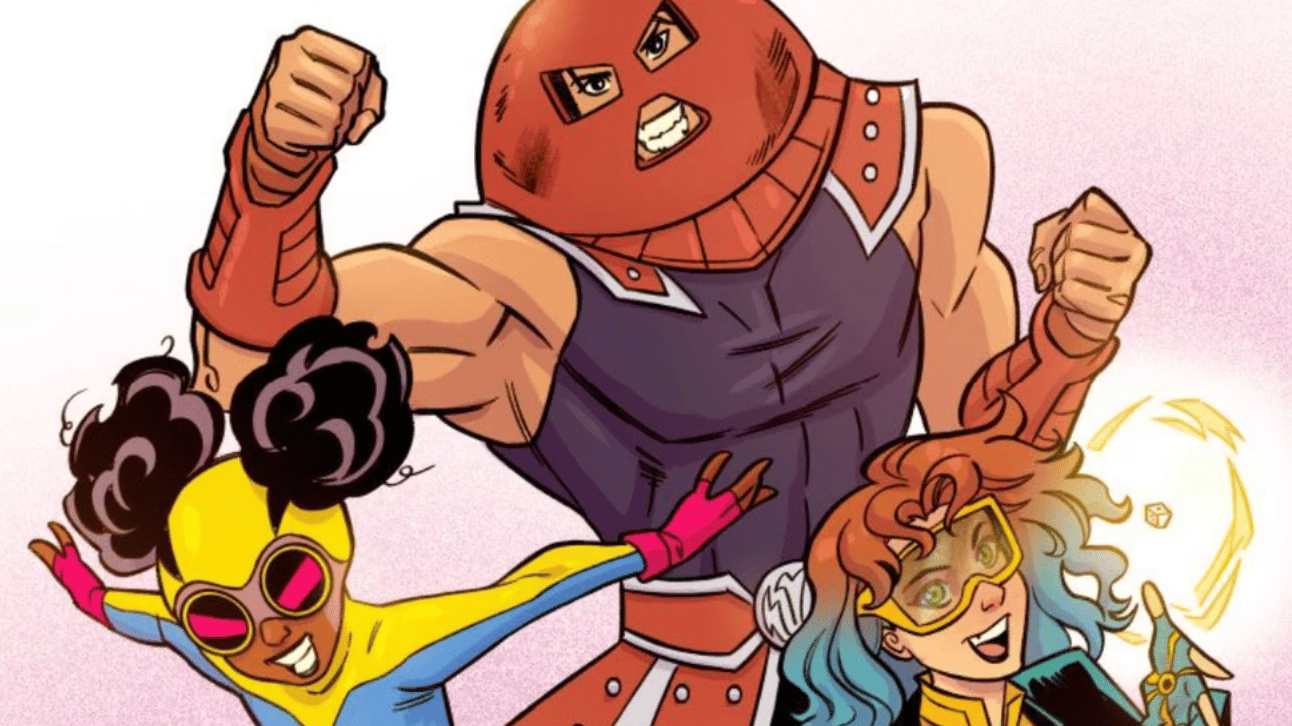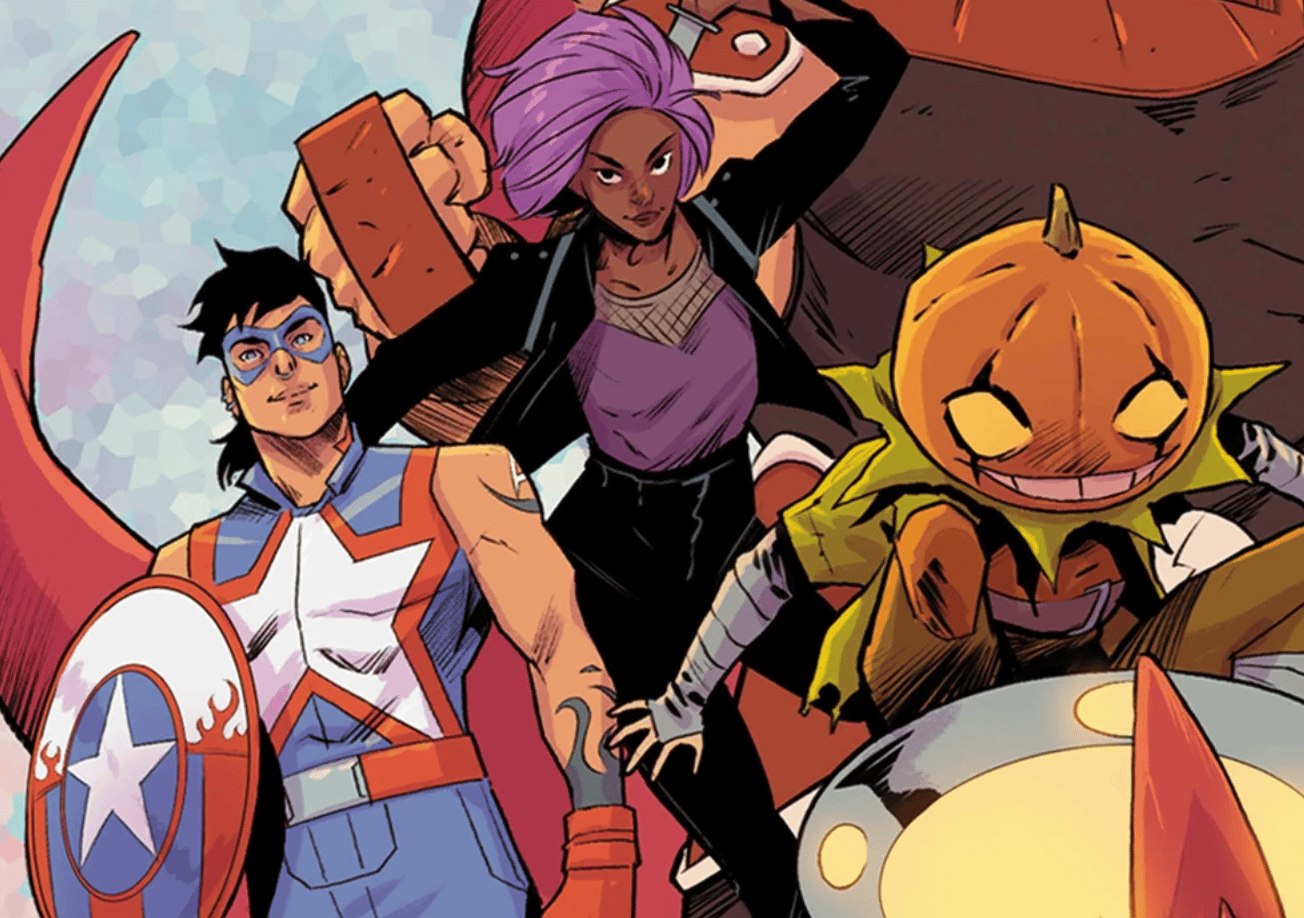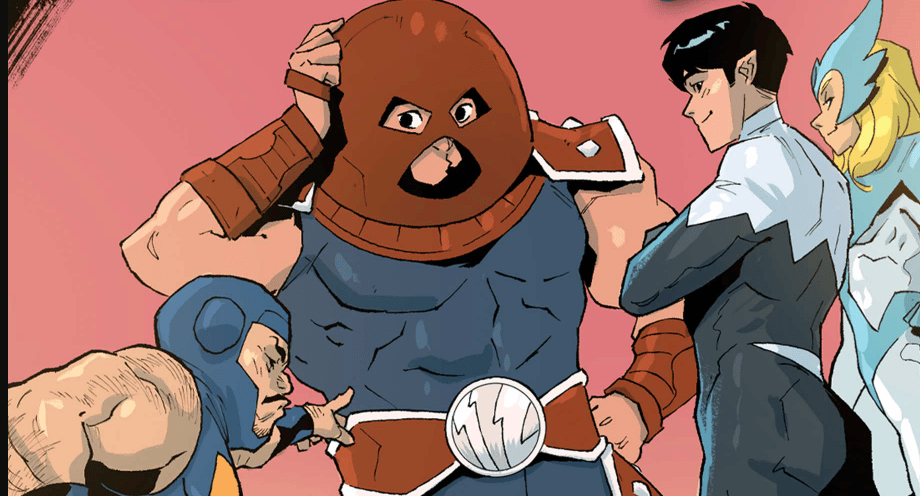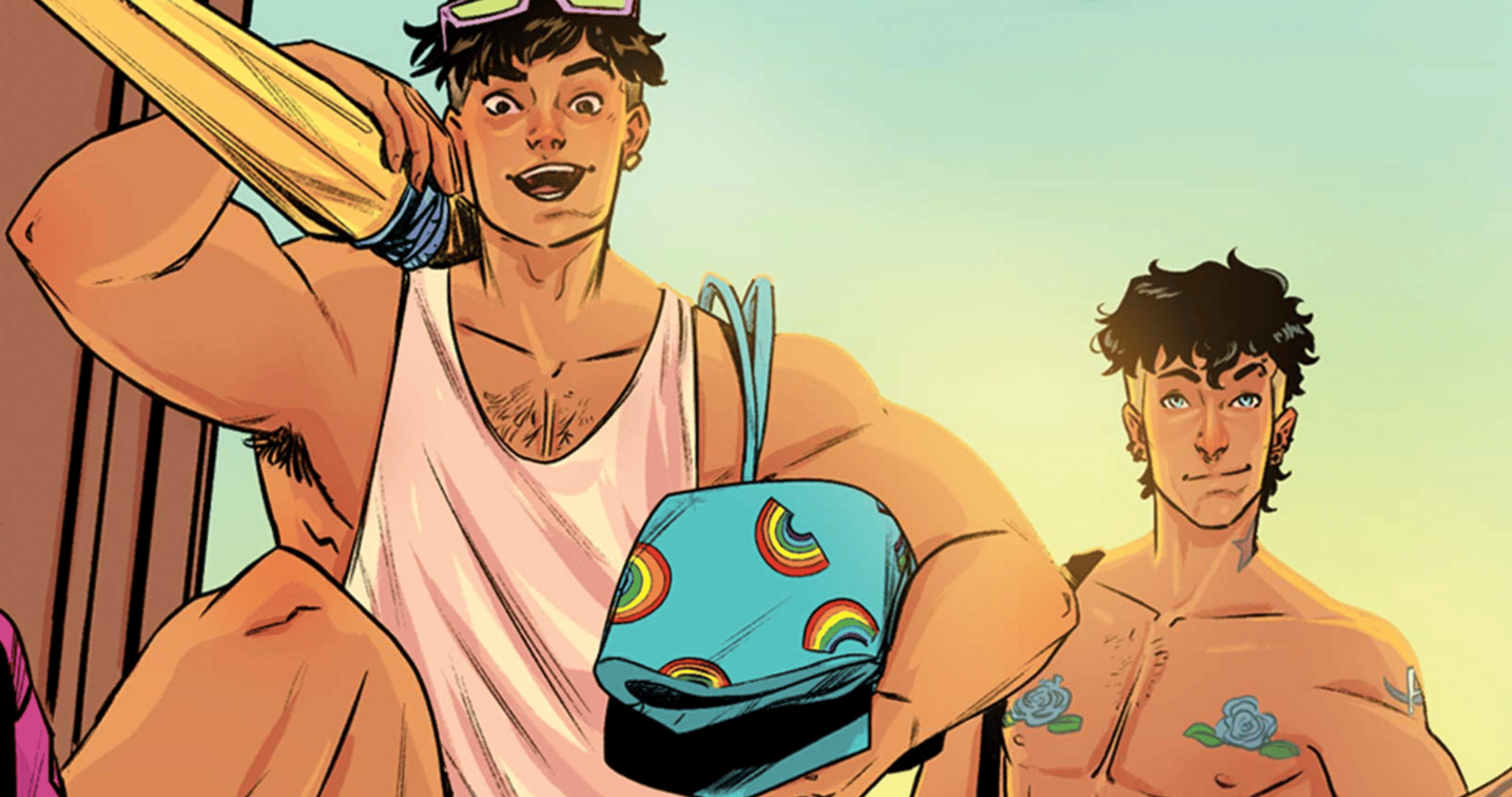- Comic Frontier
- Posts
- Interview: Anthony Oliveira Talks Avengers Academy and The End of the Series
Interview: Anthony Oliveira Talks Avengers Academy and The End of the Series
We spoke with the talented writer!

Anthony Oliveira is the writer behind the recently concluded Avengers Academy series on Marvel Unlimited with Carola Borelli, Bailie Rosenlund, and Pablo Collar. We spoke with the GLAAD-award-winning talent about the series, its recent end, and what readers can do if they’d like to see more. Check out our conversation below.
What's it like to play in a sandbox of characters that have largely a limited experience in the mainstream stories? Do you feel a responsibility to make sure these characters are handled properly? Or do you and your collaborators get excited to play in the sandbox and do so many things?
I think in some ways both are true. Our cast is made up of characters who felt to me somewhat at risk of falling into obscurity – Moon Girl was our biggest pull, coming off the cartoon, but that show was cancelled while we were in development without further plans, and Normie has existed for years but has only come into his own quite recently. The drafting process was laborious – pitching and counter-pitching characters, and you have to think about configurations – some characters you want but they need to be part of a cast, you have to think about the chemistry and alchemy of the party-build. And part of it was simply, you know, these were the ones we could get – the characters there were no plans for.
Which is exactly what I wanted. I am not a feats guy – “oh my guy’s the strongest.” Give me a little weirdo with a fucked-up power who’s just doing their best every time. Hell, that’s what Spider-Man was.
When the dust settled, these were the characters who felt to me like they had the strongest stories to tell, and the strongest voices. And in many respects that was intimidating – other than Justin Jin as my own character, some of them had only been written by their creators before me, and that makes one very nervous. Anxiety is a big motivator in mylife – you want to get it right. I was fortunate that all of them were very kind, and very willing to chat about things I was thinking about. Comics people are good people. But eventually, you just gotta step out on the high-wire and take the risk.
How important was it to center this book around queer stories? Despite being set in a superhero setting and world, it's very much a reflection of the real world. The Martha issue was particularly touching.

Thanks! It certainly wasn’t the mandate – “oh, we want you to make a queer team.” It wasn’t pitched to me that way and it wasn’t marketed that way. But my perspective informs the book. Also, from a practical standpoint, the book is queer because its cast is queer, and its cast is queer because queer people know each other! I think young people now are much less rigid about these things – there’s a gag later in the series when newcomer Mettle notices how gay everyone is and Hazmat is like “sweetie, nowadays…” But yeah at a practical level, you have six principal characters, they have to be able to date in some configurations! So add one or two and soon the bunch is spoiled lol.
The thing I never wanted it to be was a book that was inauthentic or false. They think about their queerness differently than one another – it’s a book full of pride, but it’s also laced through with complicated feelings, shame, guilt. Like, yes, I use Emplate to interrogate gay desires in our stories, but I don’t think he’s gonna make any covers in June under a rainbow flag soon lol. He’s a shadow reflection of Brielle’s own fear about monstrosity and about Escapade’s anxiety about asking out a girl – the fear that maybe the world is right and I’m a monster. Emplate gave into that fear long ago – that is, to me, the only coherent version of his character’s tragic history, which our heroes must come to grips with and ultimately reject. Our book is full of foils for characters who I think become more legibly queer in the relief of one another for those with eyes to see.
Similarly, I didn’t want our heroes to go from triumph to triumph – hate exists in this world, and it costs and it’s scary. Aaron loses his hearing in Sin’s attack. Escapade’s encounter with Sin is deadly serious. There’s no point in lying about the stakes. The Martha issue, too, was a reflection of that changing lens – Martha remembers a world, very recently, that felt safer than this one. Now she feels all too exposed and isn’t sure how she feels about that. I can imagine, you know, a more feel-good version of that story, but it feels false right now. We are all feeling the dread. You can’t just wallpaper over it. Out and proud and safe aren’t three things that combine easily in 2025.
So the book is queer because queer people exist, and the book is complicated because queerness is complicated. Stan Lee said that Marvel should be about the world outside your window. I wanted to honour that promise. Otherwise what’s the point?
What benefits does the Infinity format have compared to the original comic format and what are some of the biggest challenges? And with all of that said, what's it like to see the stories come to print?

You have to restructure how your brain thinks about scripts – Allan Heinberg used to say that comics are all about the page turn, but now there isn’t one! The eye also doesn’t “spoil” things by glancing ahead – it can’t – and you’re not dealing with dialogue fatigue that limits how many words can go on a page or in a panel. So all the regular rules go out the window. Every panel can be a splash, every panel can be dialogue, every panel is its own unit. You have to think completely differently. Dialogue, action, etc are completely restructured, and the eye isn’t going left-to-right anymore but downward!
Realizing and embracing that really unlocked what we could do – our Clikclok issue, our Stilt-Boy issue, our Emplate issue, Carola’s train fight and Bailie’s marginalia and our stunning Emplate issues are all impossible to imagine as traditional pages. We’ve done things I don’t think people have ever seen before.
You also have to rethink the length – as much as we were unfettered by not worrying about traditional pages, sales, etc, we also had to fit into the old capitalist systems lol – so every issue was 5-6 “pages”, which meant a more vignetted structure – which also lent itself to a more slice-of-life format, which let me zig and zag into character sketches or strange POVs (like Martha’s or Lizard Boy’s) or off-the-wall high-concept choices whenever I felt like it. You could explore, breathe more.
The narrative I think went from “I hope they print these” to “how will they print these???” which I am very proud of. I’d of course be delighted to see the full run in print, with the care and attention the artists and letterists’ work deserve – I think people would love to see a big AvAc omnibus!!!
What is it like to see the work of your collaborators? Are you continually in awe seeing your words come to life?
I can’t imagine a better job than getting to see your wildest, weirdest, and sometimes stupidest ideas brought to life by some of the most incredible talents in the industry.
Carola Borelli, Bailie Rosenlund, and Pablo Collar have done unbelievable, groundbreaking work reinventing what a comic can do in this form – often joined by guest artists who have shown us weird, wonderful visions of comics unfettered by the page.
On top of this, we had colorists KJ Diaz and Ruth Redmond breathing such brilliant life into the book with gorgeous palettes, and our letterists Ariana Maher and Joe Caramagna doing mind-blowing and sometimes gymnastic work above and beyond the call of traditional publishing formats. All of this shepherded by our magisterial editors Lindsey Cohick, Sidney Stubbs, and Wil Moss – and editor emeritus Sarah Brunstad, without whom this book would never existed, who placed faith in me and secured me a runway unheard of in 2020s comics. It has been the gift of a lifetime, and I’m immensely grateful.
Are there any characters you've worked with that surprised you with how much you enjoyed writing them? Is there a favorite you've created in the series?

I think of my job as being to understand how a character works when you write them – you have to analyze what makes them tick, both from within themselves as a person and also what they represent – how the mechanism works, what it’s designed to do. You learn pretty fast in comics that everyone is someone’s blorbo, but as a writer you also have to understand and respect their worst selves too. Seeing both is hard – sometimes you see actors get in trouble for over-identifying with their character – oh he’s not really the villain etc – but I think as a writer you have to both identify and see beyond that to their role in the pattern. Sometimes that means loving the character more than they love themselves – you heart aches as they do the wrong thing or beat themselves up (Aaron Fischer or Mettle come to mind), but you know they would.
I think of the established characters Carol Danvers surprised me the most. When Sarah Brunstad asked me to write her for our Assault on Eden oneshot I took pause – what did I have to say about a character whose history was full of these dark patches? That story became very much about me realizing Carol was herself the victim of so much, how much she can’t forgive herself and can’t fully fathom how badly she was abused, and now she feels so real to me. But understanding all our principals was rewarding – for each of them, before Avengers Academy started, we did a ones-hot story in Marvel Voices that was a kind of thesis for me: here’s how I think these characters work.
I didn’t create Blackheart – Nocenti and Romita did, which are big acts to follow – but I wanted to pick up a gauntlet thrown in that very first story: what does he think of the world? So we put him in flesh, we thrust him into time, and I love him dearly. I wanted a Seven-of-Nine type for our cast, someone who couldn’t stand these people, and his journey (as a traumatized queer Catholic) has meant a lot to me.
As far as characters I created, Kid Juggernaut and Mysteriant are the ones I think of as maybe my dearest sons. I fought hard for KJ (which is understandable – Marvel would always rather you pick up a toy that’s already on the shelf) but I knew both how major a hole he filled, and his voice felt so specific and unique to me. I love him dearly. And Qaari Beck is both a love letter to the never-quite-explicit queerness of Mysterio (who was pretty clearly, and in some of the novels, overtly) dying of AIDS during the height of the crisis. Qaari’s HIV+ status, and his heroism on his own uncompromised terms, felt vital and urgent (and well past time).
The biggest surprises are the ones you create as a gag who just spring to life and become so much more real than you meant. Rhinoceress and Jack O’Lantern just became full people to me without me even needing them to – they just insisted on being there, they kept demanding time. That’s always so much fun.
Similarly I never imagined Lunella and Normie’s friendship – they met and suddenly they were like “oh we’re best friends now” and I just had to respect it; that was all them, not me! As a writer those are the best moments – when you have to just listen to what the characters want.
How hard was it to walk away from this book?
Well, I DIDN’T walk away - I’m still here lol! For now I’m old Miss Havisham, sitting in my ratty wedding dress next to a rotting cake lol. As folks have been quoting from interviews I did early on, the project WAS for an initial 66 issues, which eventually bumped up to 70 after the Disability Pride moment to give us proper room to end the book if we weren’t renewed. The editors (Brunstad, Cohick, Stubbs, Moss - a wonderful team!) and I really wanted to protect space for the book to have a proper climax and denouement, which I really appreciated, so we felt secure and had a good plan for that.
But then on July 1st they received word from on high that we were done at 60, and it turned out that functionally meant we only had two issues to wrap. That was hard - you want things to end well, on your own terms. What’s that line from ANGELS IN AMERICA?
“One wants to move through life with elegance and grace, blossoming infrequently but with exquisite taste, and perfect timing, like a rare bloom, a zebra orchid... One wants... But one so seldom gets what one wants, does one?”
So saying goodbye so suddenly was difficult, of course - the ground fell out under us in a way we didn’t foresee. But that’s how all life’s endings go - and who else can say they got a run that ran for 60 issues in 2025? I am overwhelmed with gratitude, and I’m really proud of how it ended, and to have collaborated with this amazing creative team. And our pace for the project was pretty relentless (a weekly script for a year and a half!) so taking time to relax (I’m in Japan on my first vacation in a while!) and bask in people’s very kind love for the project and think about next things for myself is nice in its way.
I loved these characters and this book immensely, so goodbyes are painful. But as Immortus says, “who knows, in the tides of time, what strange wreckage may wash ashore?”
What can fans do to let Marvel know they want to see more of this story?
I believe Marvel is very happy always to receive emails at [email protected] ! If nothing else I am hopeful they will pass along their kind words to the creative team, who I’d really love to get their flowers on this. it’s been lovely seeing the avalanche of appreciation and feeling this ending has generated, so I just wanted to say thank you so much to everyone. I really loved telling these stories with all of you. <3

